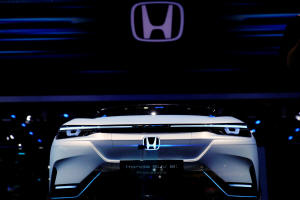|
The
reduction could be seen as a warning that automakers may not be
able to lift production volumes in the second half of the
financial year to end-March to make up for a dent caused by a
persistent shortage of chips and supply chain disruptions in the
first half of the business year.
Honda's assembly plant in Saitama prefecture, north of Tokyo,
will slash output by about 40% this month, while two lines at
its Suzuka plant in western Japan will cut back production by
about 20% in September.
Honda blamed delays in receiving parts and logistics on COVID-19
outbreaks and semiconductor shortages. The output reduction will
affect a variety of vehicles, including the Vezel sports utility
vehicle, Stepwgn minivan and Civic compact car.
The automaker said last month it would slash vehicle production
at Saitama by 40% and at Suzuka by 30% for early September.
Honda's production at those two plants returned to normal in
June after an earlier reduction but it began making adjustments
again the next month, it previously said.
Honda rival Toyota Motor Corp remained bullish on its production
plan, maintaining its record global vehicle production target of
9.7 million for the current financial year to end-March 2023,
saying its production and sales outlook would improve from
August onwards.
Toyota said last month it expected to produce 850,000 vehicles
globally in September and seek to raise production through
November, depending on supplies of parts and personnel.
(Reporting by Satoshi Sugiyama; Editing by Peter Graff and Tom
Hogue)
[© 2022 Thomson Reuters. All rights
reserved.]
This material may not be published,
broadcast, rewritten or redistributed.
Thompson Reuters is solely responsible for this content.

|
|





